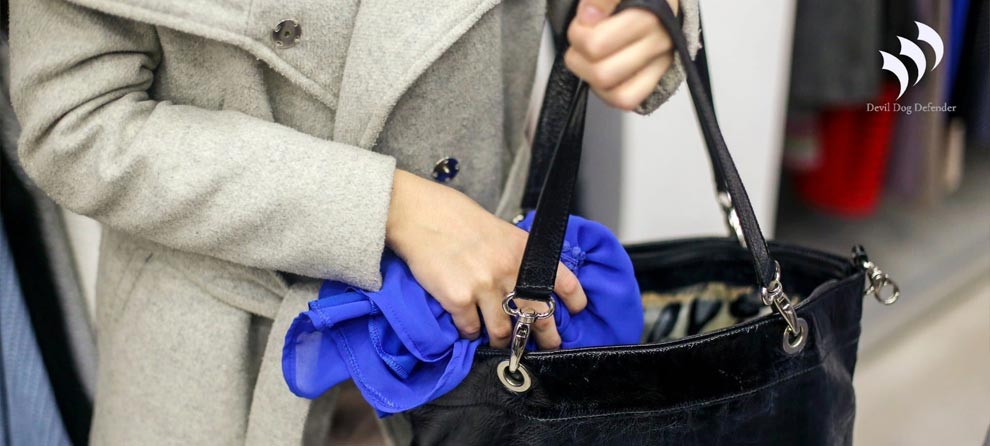NC Shoplifting Charges
Experienced Sex Crime Attorney Serving Jacksonville, Wilmington, and Surrounding Areas.
Home » Jacksonville Criminal Defense Attorney » Jacksonville Theft Attorney » NC Shoplifting Charges
Practice Areas
In North Carolina, larceny is a felony punishable by jail time, victim compensation, and even community service. The most severe charge that you can receive is a Class H felony, which could appear on your criminal record forever. Luckily, the Jacksonville criminal defense attorneys at The Wilkie Law Group have experience defending clients from all kinds of criminal offenses, including NC shoplifting charges. We prioritize every single attorney-client relationship while fighting for you, your rights, and your future in the courtroom. For a consultation, call Aden Wilkie of the The Wilkie Law Group today at 910-333-9626.
What is Shoplifting?
Shoplifting, also called retail theft, is generally defined as stealing items from a store and hiding them in your pockets or bag. But concealment of merchandise isn’t the only way to earn a shoplifting charge. Other acts of shoplifting include:
- Intending to steal merchandise from a store
- Altering price tags in a store
- Removing, or trying to remove, security tags from a store item
- Taking store merchandise out of its original packaging and hiding it among other store items
NC Shoplifting Laws
According to state law (N.C. Gen. Stat. § 14.72), almost every kind of theft crime in North Carolina is considered larceny. Larceny is always a felony in North Carolina, although the state’s law doesn’t actually define the term itself in much detail. North Carolina law does, however, give examples of larceny. The crimes listed below are described as being those of larceny:
- Concealment of merchandise in a store
- Having stolen goods in your pockets, bags, car, or home
- Stealing a shopping cart from a store
- Stealing gasoline from a gas station
- Taking car parts from a store
- Stealing items by breaking and entering (also called burglary)
Other Theft Crimes in North Carolina
In addition to shoplifting, there are many other types of theft crimes in North Carolina. Listed below are different felony charges that can result in significant jail time and hefty fines:
- Burglary is sometimes known as housebreaking, as it entails breaking and entering into another person’s property in order to execute a crime. Suspects generally break into a house with the motivation to kill or steal.
- Armed Robbery is a violent crime in which a person takes items or property while carrying a lethal weapon. The weapon employed in committing the crime doesn’t actually have to be real to receive this type of charge. For example, a thief may utilize a toy gun or another phony weapon while committing this crime. As long as it appears that the defendant had and was threatening to use a weapon, an armed robbery charge may result.
- Aggravated Robbery is similar to armed robbery in that it involves the use of a lethal weapon. However, aggravated robbery is different in that the victim is often injured during the robbery. This factor makes the crime a more serious offense compared to armed robbery.
- Attempted Robbery is when a suspect tries to steal something but ultimately fails to do so. Just because the offense was not carried out doesn’t mean that a prosecutor can’t prove that an intention to commit robbery was there.
Is Shoplifting a Felony?
Yes, shoplifting is a felony in certain circumstances. What we mean by this is that shoplifting only becomes a felony if the stolen item or items were valued at over $1,000. If a shoplifter steals an item that’s worth less than $1,000, they would likely face a misdemeanor charge.
However, there are a few situations in which someone could still face a felony shoplifting charge, even if the item they stole was worth less than $1,000. The following situations will likely result in a felony shoplifting charge in North Carolina:
- A person steals a gun, explosive device, or a device meant to start fires
- Items were stolen directly from a victim
- The shoplifter has committed larceny more than four times in the past
How Long After Shoplifting Can You Be Caught?
In North Carolina, you can be caught and charged with larceny of goods or organized retail theft within two years of the shoplifting incident. If the State seeks to bring your shoplifting case to court more than two years after the incident (absent some unique circumstances), your attorney can and should seek a dismissal from the court due to the tolling of the statute of limitations.
Many times, defendants often assume they got away with shoplifting simply because they were not caught in the act or immediately after leaving the store. This is not always the case. Stores and retailers may choose to wait to press charges until they have enough evidence against you to present a solid case. Also, many stores have video systems that capture the crime but have policies of not confronting the individual committing the crime and calling the authorities instead.

How Long Does Shoplifting Stay on Your Record?
In most cases, NC shoplifting charges will stay on your permanent criminal record forever. However, that doesn’t always have to be the case. It is possible to expunge certain charges with the help of a Jacksonville expungement attorney.
What Kind of Felony Charges Can I Expunge From my Record in NC?
Expunging a charge or conviction means that you’re basically erasing it from your permanent criminal record. This can be extremely beneficial for a number of reasons. For example, if you were trying to get a job or get into a specific college, they wouldn’t be able to see a specific criminal offense on your record. But what kind of charges in North Carolina can you expunge?
In June 2020, North Carolina’s General Assembly passed the Second Chance Act (Senate Bill 562) which allows expungement for:
- Non-violent convictions, as long as there have been at least 7 years of good behavior.
- “Not guilty” or “dismissed” charges after December 1, 2021. Expungements for these charges will be automatic.
- Juvenile misdemeanor offenses prior to December 1, 2019.
In other words, it’s certainly possible to expunge your shoplifting charge or other prior convictions in North Carolina. Speak with an experienced expungement lawyer in Jacksonville like Aden Wilkie today to see if you are eligible for expungement of your shoplifting charges.
What Happens When You Go to Court for Shoplifting?
Going to court for NC shoplifting charges can be scary, especially if this is your first conviction. But as long as you have a strong legal team like The Wilkie Law Group on your side, you can expect the best possible outcome in your shoplifting case.
When you go to court for shoplifting charges in North Carolina, your jail sentence and fines will likely depend on your prior criminal record as well as the value of the stolen goods. In other words, prior offenses of larceny of goods and a stolen item worth more than $1,000 could result in harsher penalties than a first offense of items valued at less than $1,000.
Criminal Penalties for Shoplifting in North Carolina
A suspect can face a wide variety of penalties for larceny of goods in North Carolina, depending on if they receive a misdemeanor or a felony conviction. Listed below are possible criminal penalties, ranging from least to most severe.
- Class 3 Misdemeanor: If a store owner catches a shopper hiding stolen items before leaving the store, they can face a Class 3 misdemeanor. If this is the suspect’s first offense, they don’t have to go to jail as long as they accomplish 24 hours of community service.
- Class 2 Misdemeanor: A second offense within the span of three years will result in a Class 2 misdemeanor in North Carolina. Once again, the suspect doesn’t have to go to jail as long as they accomplish 72 hours of community service.
- Class 1 Misdemeanor: If a suspect steals goods valued at less than $1,000 and this is their third offense, they will likely receive a Class 1 misdemeanor charge. Suspects could spend up to 45 days in jail.
- Class H Felony: If a suspect steals goods valued at more than $1,000, they will likely receive a Class H felony charge in North Carolina. With a Class H felony, suspects could receive a jail sentence of anywhere between four to eight months.
Civil Penalties for Shoplifting Charges in North Carolina
Criminal penalties are not the only potential consequence of shoplifting. A felony shoplifting charge can result in civil penalties, as well.
- Actual Damages: A suspect is basically required to compensate the store owner for the items stolen. If the items were damaged during the larceny incident, the suspect must compensate for that as well.
- Punitive Damages: Punitive damages always serve as further punishment to the suspect rather than compensation for the victim.
- Attorney Fees: The suspect must pay the store owner’s attorney fees as well.
The accused must pay a minimum of $150, but not more than $1,000.
Possible Defenses for Shoplifting Charges
If you’re facing a retail theft charge, you need a strong defense from The Wilkie Law Group. Depending on the facts of your case, we can use a variety of defenses to avoid a maximum sentence in jail or clear your name altogether. Some of the defenses that may be available in your case include:
- Complete Innocence – Claiming complete innocence may be the most obvious defense, but proving this can be difficult, especially if the store owner or the security camera caught you performing the crime. Even so, sometimes raising reasonable doubt is enough to decrease your potential penalties.
- Solid Alibi – If you can prove that you didn’t commit this crime with a solid alibi and witness statements, then the jury may dismiss your charges altogether.
- Mistaken Identity – Maybe there’s video evidence that allegedly shows you stealing items from a store. If that person in the video looks like you but isn’t actually you, then your attorney could claim mistaken identity.
- Lack of Evidence – Using insufficient evidence as a defense can create a lot of reasonable doubt in court. If the plaintiff can’t use pictures, security camera footage, or fingerprints to link you to the larceny, then your attorney can certainly claim insufficient evidence.
- No Witness Statements – If no one saw you committing larceny of goods, then an attorney at Wilkie Law can use this defense in your favor.
Contact a Jacksonville Criminal Defense Attorney If You’ve Received NC Shoplifting Charges
If you’re facing a retail theft charge in North Carolina – regardless of if this is your second offense or third offense – you need to call Jacksonville theft crime defense attorney at Aden Wilkie as soon as possible. At The Wilkie Law Group, we have decades of experience in crafting strategic criminal defense strategies and putting up a good fight in court, all for the sake of our clients’ livelihoods. For a consultation, call us today at 910-333-9626.




